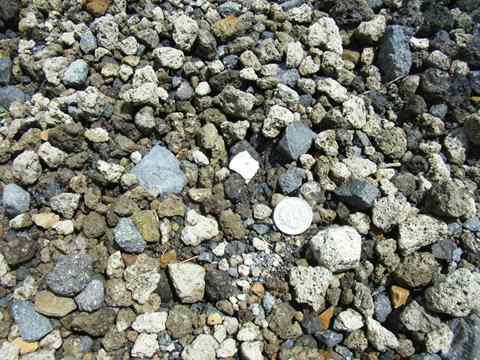Mount Asama
Nagakura, Karuizawa city, Kita-Saku county, Nagano pref., Japan
"No Trespassing" sign may be erected on the locality introduced in books depending on the activity of Mount Asama.
Occurrence
Sanidinite facies contact metamorphic rocks
Accidental lithic fragments subjected to sanidinite facies metamorphism by magma. The fragments were erupted from the crator of Maekake stratovolcano of Asama-Eboshi volcanoes in 1783 with andesitic volcanic ash, andesitic pumice, scoria. The protolith of fragments is bedrocks of Mount Asama. The age of eruption was determined by ancient documents.

Volcanic lapilli from the crator of Maekake stratovolcano of Asama-Eboshi volcanoes. The white fragment at the center is a cordierite-bearing accidental lithic fragment. The white matrix of the fragment is composed of tridymite and anorthite, and blue dots are cordierite. The porous white lapilli are andesitic pumice, and black lapilli are scoria. Massive gray lapilli are fragments of andesitic lava, and some of them contains white grains of anorthite. Mullite and sillimanite were formed in accidental lithic fragments by sanidinite facies metamorphism.
Reported Minerals
- Cordierite
- Mullite
- Sillimanite
- Anorthite
Mineral Assemblages
- Quartz - Cordierite
- Mullite - Sillimanite
- Anorthite (in Andesite)
History
- 1870's: Cordierite was collected and described.
Localities
- Mount Asama (Mullite, Xenolith)
Related Occurrences
- Albite-Epidote-hornfels facies
- Hornblende-hornfels facies
- Pyroxene-hornfels facies
- Sanidinite-hornfels facies